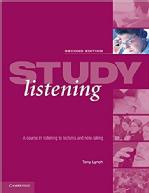Listening Materials
Listening is perhaps one of the most daunting skills for new international students upon arrival in Britain. Of course, it is even harder for anyone who is learning English outside an English speaking country.
Everyone seems to speak quickly when you first arrive in a country, and it is hard to gain the general meaning of what is said. Sometimes English tutors may, sensibly, say to students 'I advise you to listen to as much English as you can', but even if this advice is useful, it is not easy to know where to start.
Explore the material below where you can find some helpful advice for developing your listening skills.
Key advice
1. What kind of listening materials are there?
2. What makes a text easier to listen to?
3. Recommended websites to practise listening
4. Recommended interactive tasks
5. General advice for developing listening skills for academic study
What kind of listening materials are there?
In general, there are two different kinds of materials you can listen to:
- Authentic materials (this includes anything that is 'unscripted'; for example, 'live' lectures and seminars, the English you hear on the television and radio, and English spoken outside the classroom).
- Course book materials (this may include simulated lectures and seminar presentations and semi-scripted listening tasks from course books).
Note that a scripted text is one that is written down before the speakers speak (less natural). An unscripted text is one that is not written down in advance, but rather, transcribed afterwards (more natural, but often harder to follow, because in real life people do not speak in an organised or structured way).
These materials can be classified according to the list below. The list ranges from the easiest to listen to (first on the list) to the hardest to listen to (last on the list)
- A scripted talk given by one speaker
- An unscripted talk given by one speaker
- A scripted dialogue between two speakers
- An unscripted dialogue between two speakers
- A scripted or unscripted conversation between three or more people.
What makes a text easier to listen to?
In general, it is considered easier to listen to a text when:
- there is only one speaker (e.g. the news, a lecture, etc).
- the text is scripted;
- the speaker is using standard English pronunciation, or RP (though this does not mean that speaking with an accent is in any way 'wrong' or 'incorrect');
- you have some prior knowledge about what the speaker will say before you listen;
- you are interested in the topic;
- you know some of the vocabulary that will be used.
Having said this, you will also want, and will need, to develop your experience of listening to English when:
- A regional accent is used;
- There is more than one speaker;
- You do not know about the topic or subject in advance;
- People seem to speak quickly.
It will be difficult to listen to texts which include the above elements but be philosophical. You will gradually get better at listening and it is good to see this as 'experience'.
General advice for developing listening skills for academic study
Developing a routine: Listening to the news
A very useful starting point when you are developing listening skills for academic study is the news. It could be Radio 4 (92.4 to 94.6 khz) or the BBC World Service, but it could also be another radio station.
The BBC provides excellent online news programmes; for example, http://news.bbc.co.uk/ and http://www.bbc.co.uk/iplayer/categories/news. There is also a really good website which contains interactive exercises on recent news stories at http://www.breakingnewsenglish.com
Try to start by making your listening to the news into a routine - listen to the same broadcast each and every day, at the same time. Just listen to a few minutes at first, and gradually extend your listening as you feel you are getting better and more experienced.
The news is a good starting point because:
-
There is only one speaker;
-
Many of the topics are probably familiar to you already;
-
You will know quite a lot of the vocabulary (countries, people, etc.);
-
English is usually standard in terms of pronunciation.
From listening to the news, you can then progress to the next area below.
Recommended interactive tasks
Early in your stay in an English speaking country, it is very useful to try to listen to and interact with native speakers by undertaking some simple tasks. You could, for example, try:
-
Asking for directions when you are in a town or city, or at a bus stop;
-
Asking for information in a library or other public building;
-
'Listening in' to a conversation on a bus or train;
-
Phoning Directory Enquiries and asking for someone's number;
-
Phoning national rail enquiries and asking about train times;
-
Phoning the telephone banking service and asking about your account.
Make sure you ask the person you are speaking with to speak more slowly if you don't understand, and do ask them to spell words and phrases if you find them difficult to catch. These are called 'repair strategies' and are an important part of 'strategic competence'.
Recommended websites to practice listening
There are many websites out there which are excellent and free! Try out the following to help you develop your general listening skills:
- http://www.listenaminute.com (for intermediate level students)
- http://www.elllo.org (for higher-level listening excercises)
- http://www.bbc.co.uk/worldservice/learningenglish/multimedia/archive_ent.shtml
- http://www.breakingnewsenglish.com/